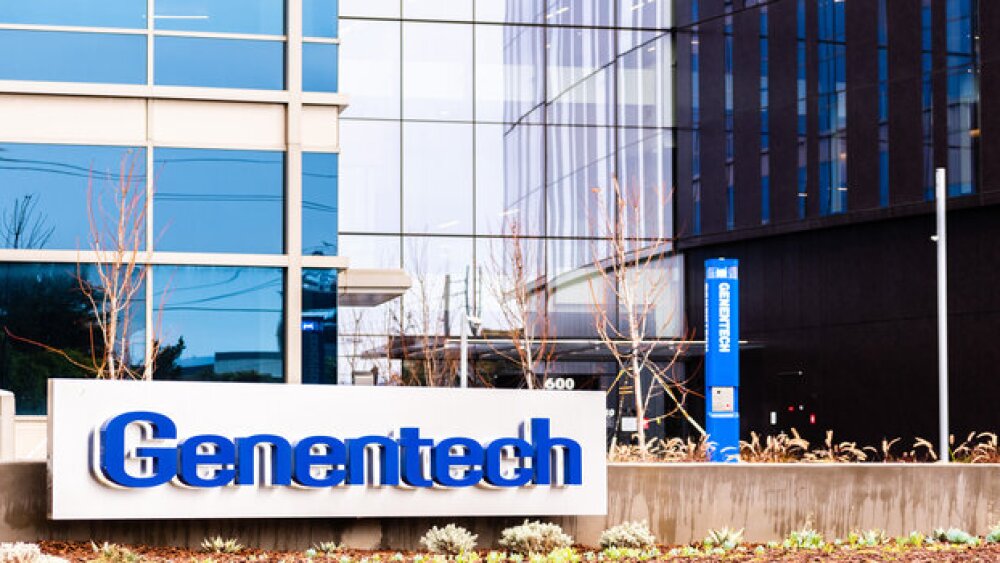Spurred by an “inadvertent” disclosure, Roche’s Genentech on Wednesday released interim and immature overall survival findings for its anti-TIGIT antibody tiragolumab in non-small cell lung cancer.
Pictured: Genentech signage at its headquarters in California/iStock, Sundry Photography
Roche’s Genentech on Wednesday posted a short update for its Phase III SKYSCRAPER-01 study, unveiling immature but nevertheless promising overall survival data for its anti-TIGIT immunotherapy tiragolumab in patients with locally advanced or metastatic non-small cell lung cancer.
The data drop follows an “inadvertent disclosure” of an interim analysis of SKYSCRAPER-01, according to the company’s press release. Anti-TIGIT drug developers, including Arcus Biosciences, Compugen and Mereo Biopharma traded higher in Wednesday’s pre-market session following Genentech’s disclosures, according to Seeking Alpha.
SKYSCRAPER-01 is a randomized and double-blinded study assessing the combination of tiragolumab with Tecentriq (atezolizumab) as a first-line treatment option in non-small cell lung cancer patients with high expression levels of the PD-L1 protein. The study enrolled 534 patients and employs two primary efficacy endpoint measures: overall survival (OS) and progression-free survival (PFS).
In May 2022, Roche’s investigational combination regimen fell short of the study’s PFS bar, unable to significantly distinguish itself from Tecentriq plus placebo. At the time, the company did not provide specific figures and said that OS data were still immature for analysis.
During its first-quarter 2023 earnings report, posted in April, Roche revealed that the study would continue to its final analysis.
According to the company’s announcement on Wednesday, it conducted another interim analysis in February 2023 based on data collected up until November 2022, which corresponded to a median follow-up time of 15.5 months.
At this data cut-off point, patients treated with the drug combo saw a median overall survival of 22.9 months, as opposed to 16.7 months in the comparator arm. The resulting hazard ratio of 0.81 indicated that there was some survival benefit associated with tiragolumab, though this effect still did not satisfy statistical significance.
Roche was nevertheless quick to point out that “interim results for the primary endpoint of overall survival were not mature” at this interim analysis.
SKYSCRAPER-01 is currently ongoing and is blinded to both patients and investigators. Roche will continue with the final OS analysis for the study, expected in the third quarter of this year or the first quarter of 2024.
Tiragolumab is a monoclonal antibody with an intact Fc region. It works by selectively binding and blocking to the novel inhibitory immune checkpoint TIGIT, which otherwise suppresses the body’s immune response against cancer.
The antibody’s mechanism of action makes it a good synergistic partner for other cancer immunotherapies such as Tecentriq, which inhibits the PD-L1/PD-1 pathway. The combo treatment could work through the dual blockade of distinct but complementary cancer cascades.
Roche is also evaluating this combination regimen in cervical cancer and squamous cell head and neck carcinoma. Wednesday’s update will not affect other studies in the tiragolumab program, the company said.
Tristan Manalac is an independent science writer based in Metro Manila, Philippines. He can be reached at tristan@tristanmanalac.com or tristan.manalac@biospace.com.
Update: The story has been corrected to clarify that the final OS analysis for SKYSCRAPER-01 is expected later this year or early next year.






